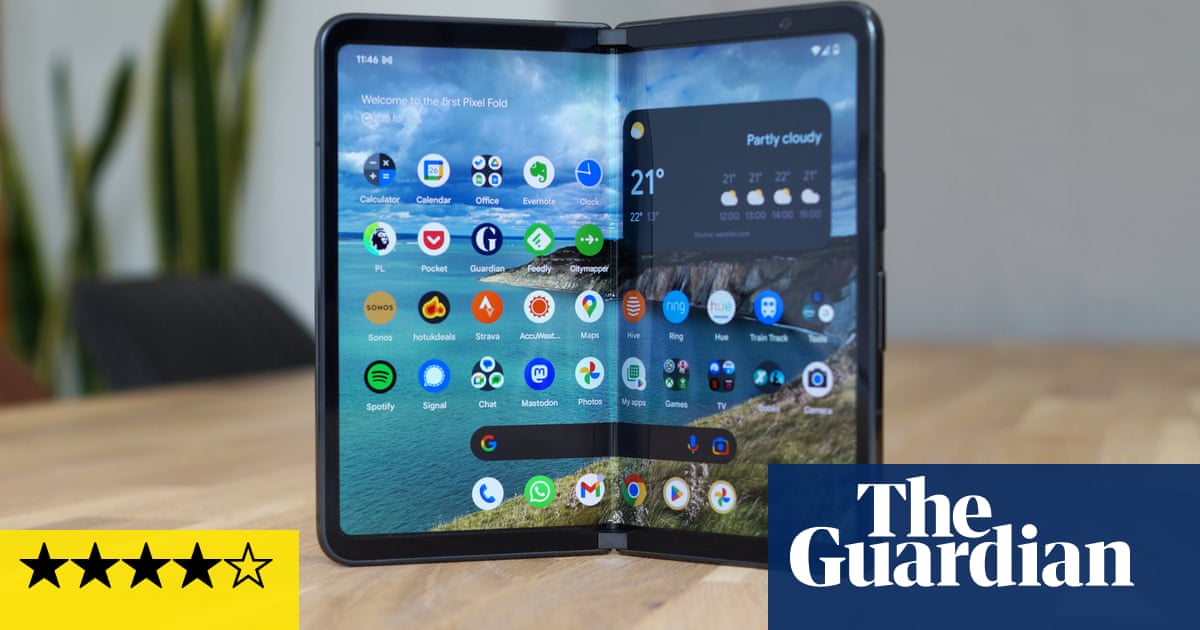
The Pixel 7 Pro looks to keep up Google’s newfound momentum in top-flight smartphones, offering a powerful camera and AI features for significantly less money than Apple or Samsung.
The Pixel 7 Pro costs £849 ($899/A$1,299) – the same as the firm’s top 2021 phone – while competing with devices costing north of £1,100. It leads Google’s phone line for 2022, which includes the smaller £599 Pixel 7 and £349 Pixel 6a.
From the front, the Pixel 7 Pro looks very similar to its predecessor, with a large, bright and great-looking 120Hz OLED screen that measures 6.7in on the diagonal. Flip it over and Google’s camera bar across the back is now wrapped in polished aluminium for a classy look.
It is a very big phone but its relatively light 212g weight and curved sides make it a little narrower and slightly easier to hold than some rivals. It feels super-solid and well made.
Google’s latest Tensor G2 chip at the phone’s heart has similar general performance to last year’s version but with significantly faster AI processing. The phone feels very responsive, particularly when performing tasks such as dictating messages and other smart systems, which can be up to 2.5 times as fast as the already rapid Pixel 6, according to Google’s estimates.
Battery life is also similar to the Pixel 6 Pro, lasting about 34 to 36 hours between charges with the screen set to its default FHD+ resolution and actively used for about five hours. That is a little short of the competition but good enough for a day of heavy use. Turning off the always-on display increased battery life by about two hours.
Specifications
Screen: 6.7in 120Hz QHD+ OLED (512ppi)
Processor: Google Tensor G2
RAM: 12GB of RAM
Storage: 128, 256 or 512GB
Operating system: Android 13
Camera: 50MP + 12MP ultrawide + 48MP 5-10x telephoto, 10.8MP selfie
Connectivity: 5G, eSIM, wifi 6E, UWB, NFC, Bluetooth 5.2 and GNSS
Water resistance: IP68 (1.5m for 30 minutes)
Dimensions: 162.9 x 76.6 x 8.9mm
Weight: 212g
Sustainability
Google does not provide an expected lifespan for the battery but it should last in excess of 500 full charge cycles with at least 80% of its original capacity. The phone is repairable by Google and third-party shops, with genuine replacement parts available direct from iFixit. Out-of-warranty screen repairs by Google will cost similar to its predecessor at about £200, and battery replacements about £100.
The Pixel 7 Pro is made with 100% recycled aluminium, accounting for about 19% of the phone by weight. The company publishes environmental impact reports for some of its products. Google will recycle old devices free of charge.
Android 13
The Pixel 7 Pro runs the same version of Android 13 as Google’s other smartphones. The latest version introduced greater customisation options for theming and various other additions leveraging Google’s expertise in AI.
Exclusive features to the new phone include the ability to unblur faces and objects using AI in the Google Photos app. It is a little hit and miss but is almost miraculous when it works, and can process new and old photos alike in only a few taps.
It joins the “magic eraser” tool that deletes or recolours unwanted objects in photos from last year. You can also insert emoji by voice while dictating messages, while Google’s at-a-glance widget on the home screen can display new rain alerts, flight tracking and notifications from a Nest doorbell.
Google will provide at least five years of software and security updates, including at least three major Android versions. Samsung supports many of its phones for five years, while Fairphone is aiming for six years, and Apple supports its iPhone for up to seven years.
Camera
The Pixel 7 Pro has three cameras on the back, which it combines into almost one continuous zoom range from 0.5x to 30x.
The 12MP ultrawide camera produces good images at 0.5x magnification, with only a little distortion around the edges. The main 1x 50MP camera is simply excellent. It captures a tremendous amount of detail across a broad range of lighting conditions, producing images at 12.5MP. But new for this year is the ability to “zoom” to 2x optical magnification by using only the centre pixels of the sensor, which works surprisingly well, matching what you would typically get from a 2x optical zoom on rivals. Apple used a similar technique for the iPhone 14 Pro.
Shots taken between 2.5 and 4.9x blend data from multiple cameras to produce better images than simpler digital zooms typically applied at these intermediate distances.
Zooming further, the 48MP telephoto camera takes over with its 5x optical magnification, producing excellent images with good detail and sharpness at 12MP. Google repeats the centre-of-the-sensor trick for a 10x optical zoom, too. From there, Google’s Super Res Zoom technology digitally magnifies to 30x zoom. Images at 15x zoom are still very good but start to look overly processed closer to the maximum.
The combined system is impressive, going further than others in blending multiple cameras into one smooth zoom range, while out-zooming all of the competition bar Samsung’s S22 Ultra, which has four separate cameras to achieve similar. I still got the best results by using the native magnification of each camera, so 1x and 5x, but having the 10x optical zoom meaningfully closes the distance on those faraway objects. The selfie camera shoots excellent 10MP images in a variety of lighting conditions, too.
Google’s low-light mode is still the best in the industry and is now significantly faster. Astro-photography mode is still brilliant. Video captured up to 4K at 60 frames a second in HDR was good, while the phone features various new tricks, including portrait blurring for videos and more control over white balance, exposure and focus.
Price
The Google Pixel 7 Pro costs from £849 ($899/A$1,299) with 128GB of storage.
For comparison, the Pixel 7 costs £599, the Pixel 6a costs £349, the Samsung Galaxy S22 Ultra costs £1,149, and the iPhone 14 Pro Max costs £1,199.
Verdict
The Pixel 7 Pro builds on the success of last year’s model, with meaningful upgrades to its camera that put it on a level with the most capable and expensive models from Samsung.
It is a well-made phone with a great screen, good performance and reasonable battery life. The faster fingerprint scanner is welcome, as is the fast but less secure face recognition for unlocking the phone. Google’s smart systems from in-line dictation to unblurring tech are thoroughly impressive, and you will get at least five years of software support from release.
But really, the Pixel 7 Pro is all about the camera. The 10x optical zoom puts it in a class that only Samsung’s very best £1,149 phone can match, and at a price that thoroughly undercuts the competition at a time when prices are rising because of weak currency rates.
It might seem odd to call an £850 phone excellent value but that is what it is. You won’t find a great phone with a camera this capable anywhere near it.
Pros: class-leading camera, 5 and 10x optical zoom, good screen, good performance, solid battery life, recycled aluminium, five years of security updates, Android 13, impressive local and photo AI features, undercuts rivals on price.
Cons: face unlock option not as secure as some rivals, no big bump in general processor performance, battery life short of best-in-class, fairly slow charging.












